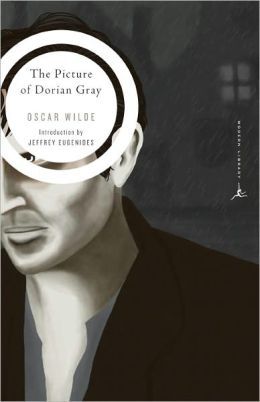Pure of heart, soul, and face, twenty-year-old Dorian Gray is the subject of a new painting by friend and artist Basil Hallward. Gazing upon the portrait of a lifetime, Dorian recognizes his beauty for the first time, just as Adam and Eve gazed upon their own nakedness. In that moment, he laments that as he ages, he will never be as young and as beautiful as in the painting, and wishes the painting would age instead of himself. Together with friend Lord Henry, Dorian descends into a cynical, shallow lifestyle, retaining his perfect visage.
First thing first, the concept of Dorian Gray’s picture is brilliant. As a reader, you only really have to accept a few moral truths for this book to work. The most difficult truth for me to accept at face value is the notion that evil eventually displays itself on a person’s face, or that a beautiful face is indicative of a beautiful soul. It’s also unclear exactly what causes the painting to magic away Dorian’s wickedness, whether by his own wishing or Basil’s (arguably homoerotic) idolatry for him — but never mind exactly how.
It is not the painting itself that unleashes a spiral of moral descent, but a moment of emotional weakness, during which Dorian is casually careless with the feelings of another. The disastrous consequences of the interaction launch the plot and incite Dorian into grander acts of sarcasm and derision. Perhaps my own natural cynicism is to blame, but I am surprised by the innocence of Dorian’s first act of cruelty. He does not slander or steal or kill anyone, at least at first. And just as Basil represents an artists’ purity, Lord Henry is pure hedonistic debauchery, only interested in his own amusement, and it’s Lord Henry that leads Dorian astray.
In fact, Lord Henry’s discourse with both Basil and Dorian is initially very off-putting. His refined manner of speaking gives credibility to his sexist and classist remarks, and it is not until the reader recognizes that Dorian’s trajectory that Lord Henry’s musings are just that — shallow diatribes condemned by the author.
I also love Dorian’s conversations with himself in the presence of his painting, when he must acknowledge and face the ugliness inside of himself. The painting is his visual double, just as he himself leads a double life of gentlemanly pursuits while also being a criminal. By some willful magic he is able to hide it in a painting, but he takes further measures to hide it in an unused apartment behind locked doors, literally locking away a piece of his soul.
Highly recommended as a piece of early fantasy classical literature that still permeates our shared zeitgeist!
“Those who find ugly meanings in beautiful things are corrupt without being charming. This is a fault. Those who find beautiful meanings in beautiful things are the cultivated. For these there is hope. They are the elect to whom beautiful things mean only Beauty. There is no such thing as a moral or an immoral book. Books are well written, or badly written. That is all.”
